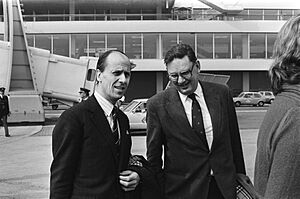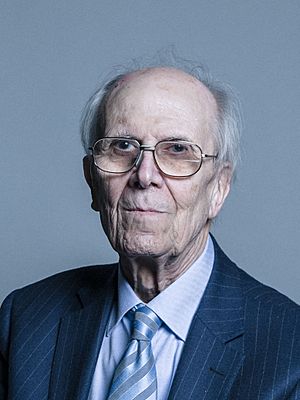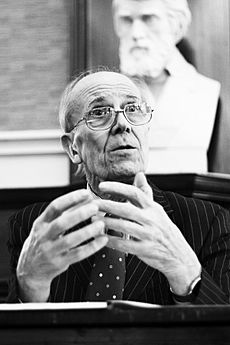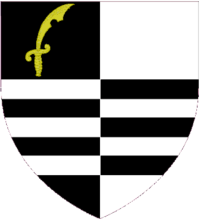Norman Tebbit facts for kids
Quick facts for kids
The Lord Tebbit
|
|
|---|---|
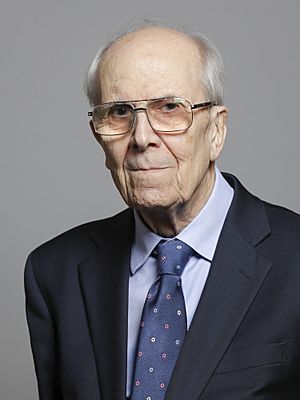
Official portrait, 2020
|
|
| Chairman of the Conservative Party | |
| In office 2 September 1985 – 13 June 1987 |
|
| Leader | Margaret Thatcher |
| Preceded by | John Gummer |
| Succeeded by | Peter Brooke |
| Chancellor of the Duchy of Lancaster | |
| In office 2 September 1985 – 13 June 1987 |
|
| Prime Minister | Margaret Thatcher |
| Preceded by | The Earl of Gowrie |
| Succeeded by | Kenneth Clarke |
| Secretary of State for Trade and Industry President of the Board of Trade |
|
| In office 16 October 1983 – 2 September 1985 |
|
| Prime Minister | Margaret Thatcher |
| Preceded by | Cecil Parkinson |
| Succeeded by | Leon Brittan |
| Secretary of State for Employment | |
| In office 14 September 1981 – 16 October 1983 |
|
| Prime Minister | Margaret Thatcher |
| Preceded by | Jim Prior |
| Succeeded by | Tom King |
| Minister of State for Industry | |
| In office 5 January 1981 – 14 September 1981 |
|
| Prime Minister | Margaret Thatcher |
| Preceded by | The Viscount Trenchard |
| Succeeded by | Norman Lamont |
| Parliamentary Under-Secretary of State for Trade | |
| In office 4 May 1979 – 5 January 1981 |
|
| Prime Minister | Margaret Thatcher |
| Preceded by | Michael Meacher |
| Succeeded by | The Lord Trefgarne |
| Member of the House of Lords Lord Temporal |
|
| In office 9 July 1992 – 31 March 2022 Life peerage |
|
| Member of Parliament for Chingford Epping (1970 – Feb 1974) |
|
| In office 18 June 1970 – 16 March 1992 |
|
| Preceded by | Stan Newens |
| Succeeded by | Iain Duncan Smith |
| Personal details | |
| Born |
Norman Beresford Tebbit
29 March 1931 Ponders End, Middlesex, England |
| Died | 7 July 2025 (aged 94) Bury St Edmunds, Suffolk, England |
| Political party | Conservative |
| Spouse |
Margaret Daines
(m. 1956; died 2020) |
| Children | 3 |
| Occupation |
|
| Signature |  |
| Military service | |
| Allegiance | |
| Branch/service | |
| Years of service | 1950–1956 |
| Rank | |
Norman Beresford Tebbit, also known as Baron Tebbit, was an important English politician. He was a member of the Conservative Party. He served in the government's top team, called the Cabinet, from 1981 to 1987. During this time, he held important roles like the Secretary of State for Employment and the Secretary of State for Trade and Industry. He was also a Member of Parliament (MP) from 1970 to 1992, representing areas like Epping and Chingford.
In 1984, Mr. Tebbit was hurt in a bombing at a hotel in Brighton. His wife, Margaret, was also seriously injured and became permanently disabled. After the 1987 general election, he decided to leave his government role to take care of his wife.
He later became a member of the House of Lords in 1992, where he continued to be involved in politics until he retired in 2022. He passed away on July 7, 2025.
Contents
Early Life and Early Career
Norman Tebbit was born in Ponders End, Middlesex, on March 29, 1931. His parents, Leonard and Edith, were working-class. He attended Edmonton County Grammar School, a selective state school in north London.
When he was 16, Mr. Tebbit started working for the Financial Times newspaper. He joined a trade union called NATSOPA. He didn't like some union rules, especially those that punished members for criticizing officials. He later remembered wanting to change how these "closed shop" rules worked.
In 1949, Mr. Tebbit joined the Royal Air Force for his national service. He became a pilot officer in 1950. He flew jet planes like the Meteor and Vampire. In 1954, he had to escape from a burning Meteor jet after it crashed. After his national service, he continued to fly part-time with the Royal Auxiliary Air Force.
From 1951 to 1953, he worked in publishing and advertising. In 1953, he became a navigator and pilot for British Overseas Airways Corporation (BOAC), which was a major airline. He was also involved with the British Airline Pilots' Association.
Becoming a Member of Parliament
Mr. Tebbit was first elected as a MP for Epping in 1970. He then became the MP for Chingford in 1974. His first action as an MP was to ask a question about an aircraft crash in Spain in 1970.
During a debate in Parliament in 1978, another politician, Michael Foot, jokingly called Mr. Tebbit a "semi-house-trained polecat". When Mr. Tebbit later became a Lord in 1992, he chose a winged polecat to be part of his family's coat of arms, showing he had a good sense of humor about the nickname.
Working in Margaret Thatcher's Government
After the Conservative Party won the 1979 election, Mr. Tebbit became an Under-Secretary at the Ministry of Trade. In 1981, Prime Minister Margaret Thatcher made him the Secretary of State for Employment. In this role, he worked on new laws about jobs and trade unions. He introduced the Employment Act of 1982, which changed rules about workers' rights and trade unions. He later said this law was his "greatest achievement" in government.
After some public unrest in 1981, someone suggested that unemployment caused the problems. Mr. Tebbit responded by saying that his own father, who was unemployed in the 1930s, "didn't riot. He got on his bike and looked for work." This led to him being famously, and sometimes incorrectly, quoted as telling unemployed people to "get on your bike." He was even nicknamed "Onyerbike" for a while.
Key Roles in Government
After the 1983 election, Mr. Tebbit became the Secretary of State for Trade and Industry. This was another very important job in the government.
In 1984, while staying at a hotel in Brighton for a political conference, Mr. Tebbit was injured in a bombing. His wife, Margaret, was also seriously hurt and became permanently disabled. This event had a major impact on their lives.
In 1985, he was chosen to be the Chairman of the Conservative Party. This meant he was in charge of the party's organization and campaigns. He also became the Chancellor of the Duchy of Lancaster. During this time, he was involved in important discussions, such as the "Westland affair," which was about a British helicopter company. He also disagreed with some decisions, like the bombing of Libya from British bases.
Mr. Tebbit was often seen as a possible future leader of the Conservative Party. He worked with the party's advertising team to create slogans and campaigns for elections. He helped the party prepare for the 1987 general election. After this election, he left the government to focus on caring for his wife.
After Leaving Parliament
Mr. Tebbit chose not to run for re-election in 1992. He wanted to spend more time caring for his wife. After the election, he was given a special title, Baron Tebbit, and became a member of the House of Lords. This allowed him to continue being involved in politics. He retired from the House of Lords on March 31, 2022.
Views on Europe
Mr. Tebbit had strong views on Britain's relationship with Europe. He was a supporter of Britain joining the Common Market in 1970. However, over time, his views changed.
In 1992, he gave a speech at a Conservative Party conference where he questioned the Maastricht Treaty. This treaty was a big step towards closer European cooperation. He asked the audience if they wanted a single European currency or to be citizens of a European Union, and they responded with "No!" He received a lot of applause for his speech.
Later, in 2007, Mr. Tebbit became a supporter of the "Better Off Out" campaign. This group believed that Britain should leave the European Union. He explained that he thought the UK would be better off governing itself, rather than being part of a larger European Republic.
Continued Involvement in Politics
Even after leaving the House of Commons, Mr. Tebbit remained active in political discussions. He often shared his opinions on the direction of the Conservative Party. He supported different leaders over the years, like John Redwood and David Davis.
He also spoke about the importance of open and honest debate in journalism. He believed that politicians should not be afraid to speak their minds.
Mr. Tebbit was the vice-president of a group called "Conservative Way Forward." He often criticized the Conservative Party for moving too much towards the political center. He believed this created a space for other parties to grow.
Other Political Views
Views on Overseas Aid
In 1996, Lord Tebbit shared his thoughts on aid sent to Africa. He believed that much of this aid did not reach the people who needed it most. He suggested that it sometimes ended up in the wrong hands. A charity called Oxfam disagreed, saying his view was too simple.
Views on Northern Ireland
In 1999, Mr. Tebbit spoke out against changing the name of the Royal Ulster Constabulary (RUC), which was the police force in Northern Ireland. He felt that the RUC had done important work in keeping law and order.
Views on the Miners' Strike
In 2009, Mr. Tebbit reflected on the 1984–1985 miners' strike. He expressed some regrets about the impact it had on mining communities. He noted that many of these communities faced great challenges after the mines closed. People lost their jobs, and this led to difficulties for families and young people. He felt that the scale of the closures caused significant damage to these areas.
Personal Life and Later Years
Mr. Tebbit lived in Bury St Edmunds, Suffolk. He had two sons and a daughter. He enjoyed cooking and even published a book about cooking game.
In 2013, he had a heart problem, but he praised the National Health Service (NHS) for helping him quickly. He later realized he had been living with a heart condition for many years. He thought this condition might have even played a role in his jet fighter crash back in 1954.
His wife, Margaret, passed away in 2020 at the age of 86. She had been ill for some time. Mr. Tebbit himself passed away at his home on July 7, 2025, at the age of 94.
In the Media
Mr. Tebbit was often featured in the media. Comedians like Ben Elton sometimes made jokes about him. He was also interviewed for TV documentaries about politics.
He was nicknamed "The Chingford Skinhead" by some critics. He was famously shown as a tough character in the satirical puppet show Spitting Image. This show often made fun of politicians.
In 2010, Mr. Tebbit had a small incident during a Chinese New Year parade. He apologized after trying to stop the noise from a ceremonial dragon. He said he didn't realize it was a parade and later sorted things out with the organizers.
He also appeared on radio programs to talk about his life and career.
Work as a Columnist
Mr. Tebbit wrote columns for several newspapers and magazines. These included The Sun, The Mail on Sunday, and The Daily Telegraph. He also wrote for The Guardian and New Statesman.
Books
- Britain's Future: A Conservative Vision (1985) ISBN: 0-85070-743-9
- Britain in the 1990s (1986) ISBN: 0-86048-006-2
- Values of Freedom (1986) ISBN: 0-85070-748-X
- New Consensus (1988) ISBN: 1-871591-00-7
- Upwardly Mobile (Futura, 1991) ISBN: 0-297-79427-2
- Unfinished Business (Weidenfeld and Nicolson, 1991) ISBN: 0-297-81149-5
- Lindsay Jenkins Disappearing Britain: The EU and the Death of Local Government (Britain in Europe) (2005) ISBN: 0-9657812-3-2. (Foreword).
- The Game Cook (2009) ISBN: 978-1-906779-11-5
Arms
|
 | Aurelia Browder |
 | Nannie Helen Burroughs |
 | Michelle Alexander |


